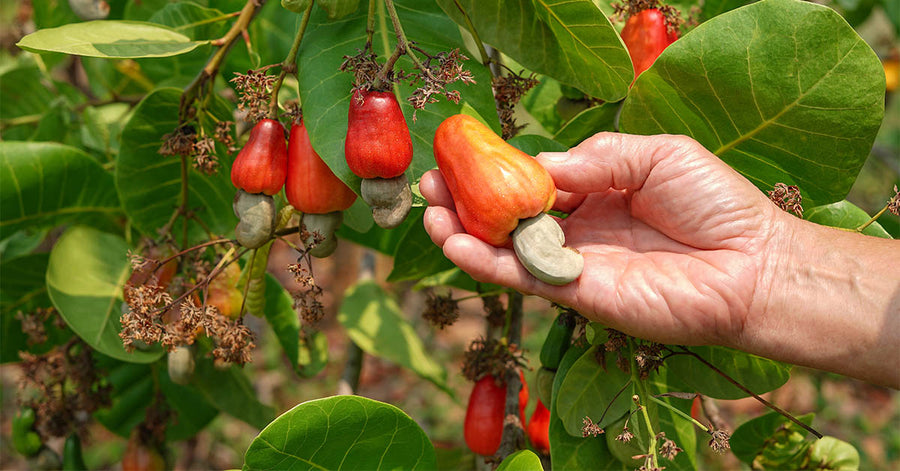Mildly sweet and surprisingly creamy, the cashew nut has transformed over the years from innocuous player in the mixed nut bowl to prized household staple. Aside from being truly delicious in its own (snackable) right, it has become a go-to ingredient for nondairy milk, cheese, frosting, and more. The adorably curled tree nut is nearly unparalleled in versatility; current demand attests to this, with production more than doubling between 2000 and 2018.
But with this surge in popularly comes a world of growing pains, mostly shouldered by the farmers, field workers, and local ecology where cashews are grown.
The cashew nut is native to South and Central America, where it was known as “acaju.” Portuguese explorers began exporting the cashew as early as 1560 and it was soon thriving in other tropical climates, where it was often used to prevent soil erosion. Today, cashew farming is largely concentrated in West Africa, India, and Vietnam.
With most food crops, it’s the growing and harvesting that are the primary challenge. With cashews, however, it’s after the harvest that things start to get interesting. Cashew trees—cousin to the notorious poison ivy vine and poison sumac—contain a toxin called anacardic acid that’s found in the hull and skin surrounding each cashew kernel. This toxin can cause serious contact dermatitis and burns if handled without protection. To turn the toxic raw cashew nuts into edible kernels, the hull must be cracked open, the cashews extracted, and the sticky skin removed with heat—typically steam. This heating process also ensures that any residual anacardic acid left on the exterior of the cashew kernel is neutralized, making them safe to eat.
Many of the countries growing cashews are among the least developed in the world and lack local processing plants to transform their cashews into an edible end-product. In Africa, for example, nearly 90% of the raw cashews grown are exported for processing, typically to India or Vietnam. Unfortunately, this lack of vertical integration cuts deeply into the profits of the smallholder farmers growing the cashews—an estimated three million in Africa alone. In 2017, raw cashew nuts were netting their growers about $2.00/kg, while the cashew kernels, hulled and skinned, were selling from the processing facilities for over five times that amount.
Sadly, that added value rarely reaches the workers in the processing plants. Most workers in the cashew industry are paid low wages, do not have contracts, and get paid by the harvest quantity, making speed a priority—a serious liability when handling the toxic, raw nuts. Gloves are an added expense that are often not provided by the processing plants, and many workers opt to forego them anyway, as the material can make them clumsier and cut into their hulling speed. Hands scarred by anacardic acid are a common site. Child labor is sometimes used, as is forced prison labor, infamously by a few processing plants in Vietnam where drug rehabilitation inmates were reportedly tortured if they didn’t meet their daily quota of hulled nuts.
It’s easy to overlook these details when we’re scanning the shelves for an affordably priced bag of cashews. After all, they’re not an inexpensive nut! But when we hold price (and possibly an organic certification) as the sole determinant of our shopping decisions, we risk supporting the food systems that harm the humans producing our food. As consumers, we must do better.
At Navitas Organics, doing better for the farmers and workers who grow and process our superfoods is one of our primary missions. Our cashews are grown in Vietnam by a collective made up of smallholder farms that obtained their organic certification in the late 90s. They eventually built their own processing facility, prioritizing the safety and support of the workers. This vertical integration means that farmers and workers are able to earn living wages and ensures full traceability of the cashews and cashew products they produce. It also means that dollar for dollar, more of what you pay for our cashews goes back to the humans producing them and not to big manufacturing corporations. Our cashews will never be the cheapest on the shelf—and we’re proud of that.
Looking for delicious and creative ways to use our sustainably sourced organic Cashews at home? Click HERE for some of our favorite cashew recipes.
)

